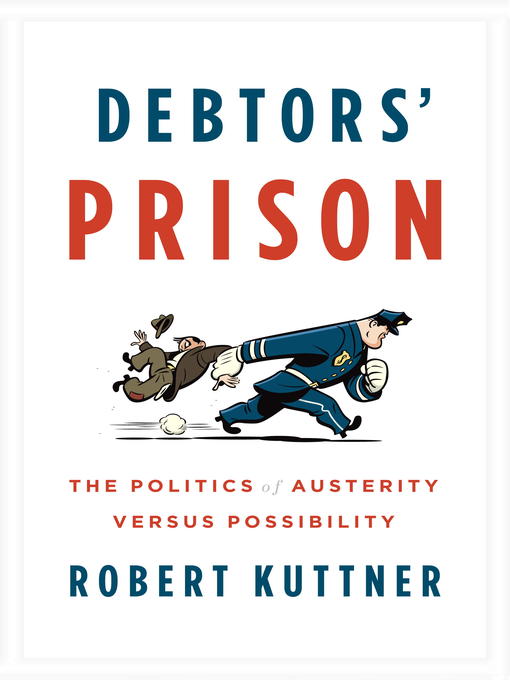
Debtors' Prison
The Politics of Austerity Versus Possibility
کتاب های مرتبط
- اطلاعات
- نقد و بررسی
- دیدگاه کاربران
نقد و بررسی

March 18, 2013
Kuttner (The Squandering of America), cofounder and co-editor of the American Prospect, pulls no punches in his latest full-throated defense of Keynesian economics and repudiation of the modern neoliberal system. Kuttner argues that rather than helping countries live within their means, austerity hampers economic growth and prevents recovery. Alternately rousing and oversaturated with statistics, the author nevertheless makes a convincing case that fiscal policy has been hijacked by the vested interests of international finance and the moneyed classes. Every economic crisis over the past several decades has sparked the same two-pronged response of prodigal bailouts of multinational investment banks and crippling strictures on the public sector. These strategies are enforced by elites with no democratic accountability and dangerously little local knowledge. For example, in their negotiations with Greece, the E.U. and the E.C.B. have demanded that the majority of Greek airports be abruptly sold off, a strategy that may raise several million dollars but would create massive social disturbances. When elected Greek officials agree to absurd conditions like these, they are of course voted out of office, while the jobs of the bureaucrats who came up with them remain secure. Kuttner’s deft overview of economic history—most notably his coverage of the Marshall Plan—demonstrates that economic stimulus can be very effective at ending recessions. Agent: Amanda Urban, ICM.

April 15, 2013
American Prospect co-founder and -editor Kuttner (A Presidency In Peril: The Inside Story of Obama's Promise, Wall Street's Power and the Struggle to Control Our Economic Future, 2010, etc.) critiques the Obama administration's embrace of debt-driven austerity policies and calls for the resumption of postponed financial reforms. "Only the Republican refusal to entertain any tax increases under any circumstances saved the Democrats from even worse policies--at least so far," writes the author, who insists that austerity is no match for a deflationary depression in progress. Historical background provides him precedents for such ideas as writing down unpayable debts, like mortgages, and reorganizing insolvent issuing institutions. These approaches were part of America's legacy in the past but are not included in today's policy discussions and are "far outside the political mainstream." Kuttner believes that public policy must find ways to give relief to private debts that are "depressing demand and holding back recovery." He asserts that the Federal Reserve has the power to play a direct role in this effort, and he also provides a discussion of the European financial crisis. Framed by intriguing discussions of the development of bankruptcy law from 18th-century English precedents and 19th-century political conflicts between independent farmers and corporate middlemen over credit and money creation, the author's focus on Obama is unsparing: "on the issue of spending cuts, Obama had already given away the game... it was all to clear that the eventual bargain would be fiscally conservative with cuts in Medicare and Social Security." Illuminating economic history and sometimes eye-opening about the current situation--however, this version of leftist economics will likely be taken as an ideological counterpoint to rightist free market doctrines, rather than a political solution capable of bringing representatives of different interests together in common purpose.
COPYRIGHT(2013) Kirkus Reviews, ALL RIGHTS RESERVED.

June 15, 2013
Entrepreneur Kuttner (Heller Sch. Brandeis Univ.; cofounder & coeditor, The American Prospect) writes a timely title to take readers on a historical tour of indebtedness, starting in 1692 with Daniel Defoe and ending with the recent recession and according to Kuttner, the misguided austerity regimes that sprang up in response. While the focus is on the United States, the European debt crisis is also well represented, as is the International Monetary Fund (IMF) and its dealings in emerging economies, especially Asia. Kuttner draws thorough comparisons among the Depression, World War II, and present day fiscal engineering. Different types of debt are also examined: national, corporate, consumer, and speculative, as well as their effect on individuals and nations. VERDICT An insightful and relevant look at the topic of debt in the United States and abroad. Recommended for academic and business collections.--Susan Hurst, Miami Univ. Libs., Oxford, OH
Copyright 2013 Library Journal, LLC Used with permission.

May 1, 2013
Kuttner, entrepreneur, editor, and columnist, declares, Today, in the aftermath of collapse, we need . . . more public borrowing to jump-start a depressed private economy. Yet our current public debate has been about less public investment, not more, and the author laments the widely held view that in a deep slump the main goal of fiscal policy should be austerity. The author sets out to address the current crisis and the history of debt and debt relief, hoping to bring clarity to the dynamics of austerity and the debates about historical debt relief and to consider alternatives. To move forward, Kuttner offers his basic principles, including, in the U.S., reducing principal and refinancing underwater mortgages, restoring the Glass-Steagall Act, and breaking up the largest banks. In Europe, he recommends moving from austerity to debt relief and new investment by giving the European Central Bank the U.S. Federal Reserve's powers and then acting on them. This timely, thought-provoking book will add valuable insight to ongoing fiscal-policy debates.(Reprinted with permission of Booklist, copyright 2013, American Library Association.)

























دیدگاه کاربران